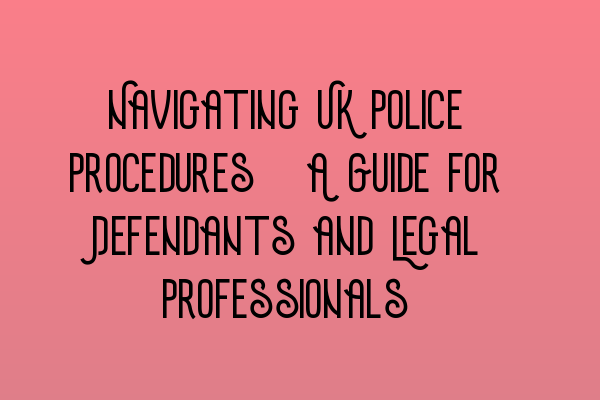Navigating UK Police Procedures: A Guide for Defendants and Legal Professionals
Welcome to the SQE Criminal Law & Practice Law UK blog! In today’s article, we will provide you with a comprehensive guide on navigating UK police procedures. Whether you are a defendant facing criminal charges or a legal professional seeking to understand the intricacies of police protocols, this guide will equip you with the knowledge you need to navigate this complex process.
The Importance of Understanding UK Police Procedures
Effective representation in criminal cases requires a thorough understanding of the police procedures followed in the UK. By familiarizing yourself with these procedures, you can identify any potential procedural errors or breaches of your rights, which can significantly impact the outcome of your case.
Before diving into the specifics, let us first cover some related topics that are essential for a comprehensive understanding:
- Demystifying the Solicitors Qualifying Examination Format
- LLC Formation Made Simple: Step-by-Step Guide for UK Entrepreneurs
- Business Regulations in the UK: A Comprehensive Overview
- Ethical Considerations in UK Law: Upholding Professional Standards
- Preparing for the SQE Exam: Strategies and Resources for Success
Understanding UK Police Powers
Before delving into the specific procedures, it is crucial to understand the powers that the police hold in the UK. The police have the authority to:
- Stop and search individuals
- Arrest and detain suspects
- Seize evidence
- Conduct interviews
- Charge individuals with criminal offenses
It is essential to be aware of these powers and understand the circumstances under which they can be exercised.
The Arrest Process
The arrest process is a critical stage in criminal proceedings. It is vital to know your rights and obligations if you find yourself being arrested. The following steps are generally involved in the arrest process:
- Identification and introduction
- Cautioning
- Reason for the arrest
- Transportation to the police station
Understanding the arrest process can help you determine if any errors or infringements have taken place.
Interviewing and Questioning
Once at the police station, you may be subjected to interviews and questioning as part of the investigation. It is crucial to understand your rights during the interview process and seek legal advice if necessary. The manner in which the interview is conducted, including factors such as the presence of legal representation, can significantly impact the validity of any statements made.
Challenging Police Evidence
One of the key roles of legal professionals in criminal cases is to challenge the admissibility and reliability of police evidence. This may involve scrutinizing the legality of police actions, such as search warrants or seizure of evidence, as well as evaluating the chain of custody for gathered evidence to ensure its integrity.
By understanding the intricacies of UK police procedures, you can identify any potential weaknesses in the evidence against you and take appropriate steps to challenge its validity.
Conclusion
Navigating the UK police procedures can be complex, but with the right knowledge and guidance, you can effectively protect your rights and achieve a favorable outcome in your criminal case. Understanding the arrest process, interview protocols, and the powers of the police is crucial for defendants and legal professionals alike.
For more related articles, be sure to check out the following:
- Demystifying the Solicitors Qualifying Examination Format
- LLC Formation Made Simple: Step-by-Step Guide for UK Entrepreneurs
- Business Regulations in the UK: A Comprehensive Overview
- Ethical Considerations in UK Law: Upholding Professional Standards
- Preparing for the SQE Exam: Strategies and Resources for Success
Stay tuned for more informative articles from SQE Criminal Law & Practice Law UK!
